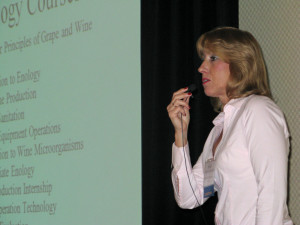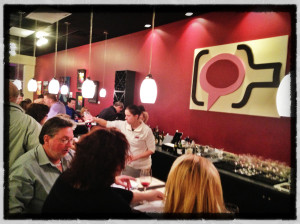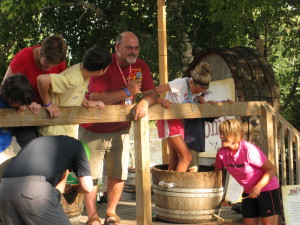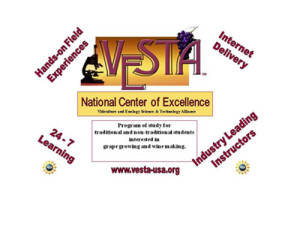The Wine School Boom
If it seems that half of your colleagues in the wine industry have taken up some form of wine education, you’re not imagining things. Enrollment in wine schools is up, thanks in large part to distributors, retailers and winery employees who’ve decided to sharpen their expertise in this fast-growing industry.
‘Most of our students are entrepreneurs who want to start their own wineries,” says Michelle Norgren, director of VESTA (Viticulture and Enology Science and Technology Alliance), a partnership of 20 colleges and universities. Funded by the National Science Foundation. VESTA is easily the powerhouse of wine training in the Midwest, grooming hundreds of students each year for two-year degrees or technical certifications in viticulture or enology. Current enrollment is 869 students, ranging in age from 18 to 78. ‘I’d say 80 to 85 percent already work in the industry, or they want to.”
Many students are drawn to VESTA for the business courses that relate to wineries. ‘You can grow wonderful grapes or make great wine, but if you don’t know marketing, what you have is a really expensive hobby,” Norgren says. Norgren attributes what she calls a ‘healthy increase” in VESTA enrollment to the growth of the wine industry over the last decade: ‘Because consumers now want to buy local and consume local, agritourism is up. The wine industry can support those trends–but you need education to make it happen. If you’re an entrepreneur, you need to know how to make a great product.”
VESTA is one of several routes to earning wine credentials; another is through privately owned schools such as the American Wine School (AWS) in Cleveland, an Approved Program Provider for the London-based Wine & Spirit Education Trust (WSET). ‘As consumers become more wine curious, industry professionals are charged with staying on top of their game,” says Marianne Frantz, founder and president of AWS. ‘For those wanting to get into the business, becoming certified tells the employer that this candidate is serious and is in it for the long haul. It marks the difference between having a job and starting a career.”
Since the school’s inception in 2001, more than 500 candidates have sat for wine certification exams; about 40 percent either were in the industry or planning to work with wine. ‘The American Wine School has seen a huge jump in the number of candidates who want to sit for an exam and become certified,” says Frantz, including wholesalers, retailers, family members of winery owners, wine writers and ‘second career hopefuls–all with an eye on becoming more wine savvy.” To keep up with that demand, Frantz has grown her school from a small Cleveland operation to a regional enterprise, adding classes in Chicago, Columbus and Pittsburgh.
Cortney Casey decided she wanted to learn more about wine and chose the Court of Master Sommeliers, another international wine school–this one focusing on beverage service. ‘I needed to branch out so I could compare other wines with Michigan’s,” says the owner of the ‘Michigan by the Bottle” tasting room in Shelby Township, Michigan, and publisher of a newsletter of the same name. She likens the two-day intensive Level 1 course to ‘going around the world in wines.”
‘People really want to connect with the wines we serve; they ask how the grapes were grown, how the wine was made, and it’s my job to inform them.” Casey says most people in her class were there ‘for their jobs.” She hasn’t decided whether to continue her studies; Court of Master Sommeliers offers four levels of certification. Even if she doesn’t continue, she says, ‘I have a little better perspective now for discussing wine with customers.”
Mike White, Iowa’s state viticulture specialist, chose to become a Certified Specialist of Wine (CSW), a self-study certification offered through the Society of Wine Educators (SWE), and agrees that the demand for wine credentials is soaring. ‘It’s because the wine industry is maturing, especially in the Midwest,” he says, ‘and anytime you have an industry maturing, certifications and nominals follow. It’s your green card.”
White believes that SWE, which also offers Certified Wine Educator (CWE) and Certified Specialist of Spirits (CSS) credentials, ‘sees the writing on the wall now” by offering this menu of training options to wine industry professionals. Many distributors and wine industry employers are requiring their account reps to get certifications–and some are less than thrilled to be back in school. ‘They hate it,” he says. ‘Most of the reps couldn’t care less about getting credentials. They tell me, `I’m selling wine, I don’t have to sit for a hundred hours of studying and exams.'” White pursued the CSW because his ultimate goal is to teach wine classes, and the CSW is a prerequisite for the Certified Wine Educator status.
For busy wine professionals, self-study seems to be the trend. Society of Wine Educators’ courses all are self-study. The Court of Master Sommeliers is self-study with a two-day intensive class, and the American Wine School likewise has begun incorporating the self-study/intensive approach in teaching WSET’s three-level program.
VESTA is a flexible program; students take instructor-guided classes online, with live interaction between student and teacher–and those who don’t feel they need a degree or technical certificate can take a single class if they like. Award winning winemaker Justin Osborne of Four Daughters Winery in Spring Valley, Minnesota was one such student. ‘I needed to learn a mix of enology and viticulture, so I just took the classes I thought I needed,” he says. ‘If you want to sell wine, then there are things you have to know.”
Some VESTA students elect to take only the business courses. ‘Even in a family winery that’s been operating for years, they may need to know more about business plans, marketing or human resources,” Michelle Norgren says.
VESTA also offers non-credit professional development classes, she says, ‘for people who with specific needs. Maybe they want to learn about new yeast research, for instance, or controlling pests.” VESTA students pursuing technical certificates and degrees also do hands-on field study with Masters-level instructors at one of 300 partner-vineyards or wineries across the country. ‘So they get both academics and real-world experience,” Norgren says. ‘It’s as much like on-the-ground traditional classes as you can get online.”
Consensus is, whether a person is growing grapes, making or selling wine, the pressure is on everyone in the industry to be both wine-savvy and credentialed, says Marianne Frantz, with ‘knowledge of what’s in the glass as well as a certificate for [your] office wall.
‘Best bet: take a wine class to brush up on current labeling laws, trends and appellations. Doing so will make your job of selling wine a wee bit easier.”
Links to Wine Educators Mentioned in This Article:
This article was sponsored by: VESTA: Viticulture and Enology Science and Technology Alliance
The Court of Master Sommeliers





